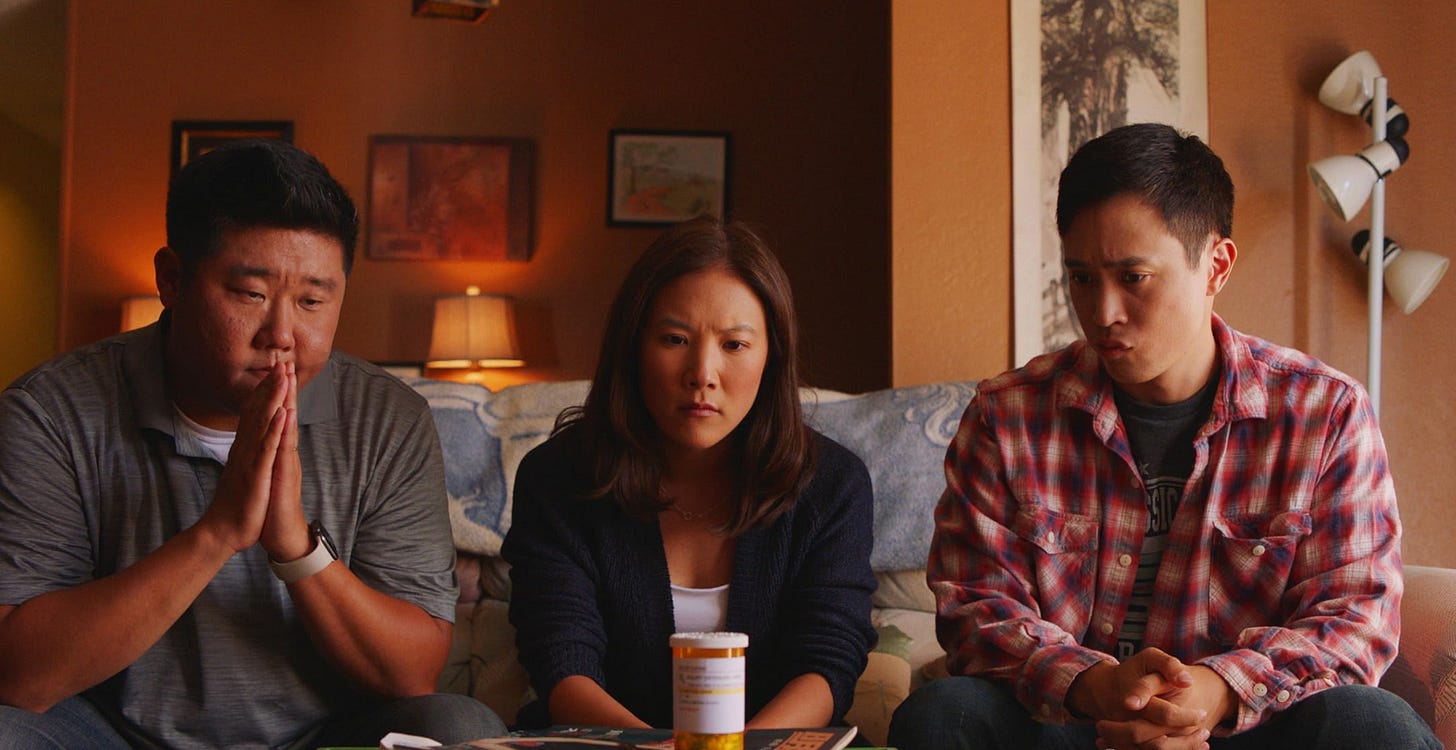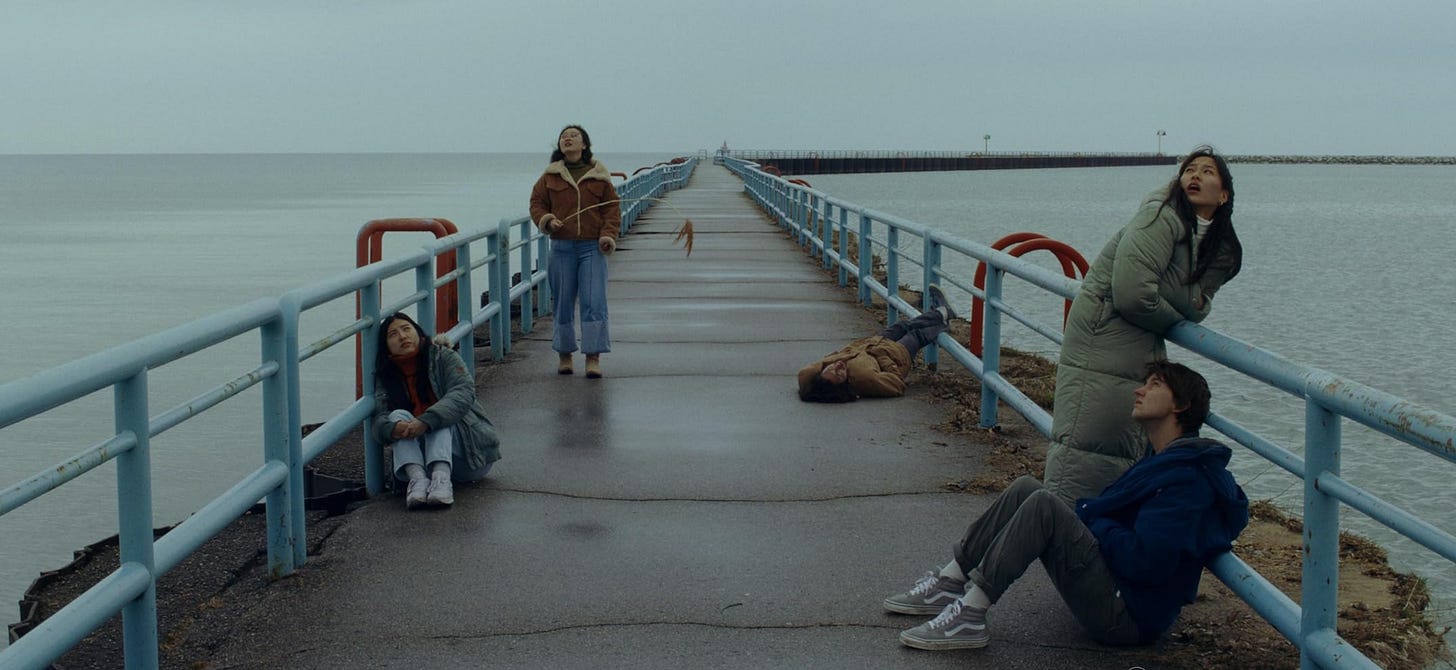Asian Film Festival of Dallas retrospective- Part 2
Wherein Elizabeth discovers that she and Tubi both love mumblecore
Confession time- I had experience with this genre before I knew what its name was. Now I’m kind of sorry that I know the word “mumblecore” because it seems a bit insulting, and I love these kinds of stories. Even the person who coined the term thinks it’s awful. For the uninitiated, mumblecore movies are typically independent, low-budget films that focus on relationships, especially among young adults. They employ a naturalistic acting style and long stretches of dialogue, so the script and the actors both have to be on their game for the film to work. Only two of these fit the genre conventions closely, but all four are relationship comedy/dramas where the plot takes a back seat to the personal development that happens during all that talking. Also all of these films are available on Tubi. Coincidence? Conspiracy? You be the judge.
As I mentioned previously, recent festivals have heavily featured Asian-American directed films because the film industry in many countries hasn’t quite recovered yet. On the plus side, by 2022 travel restrictions had eased enough that directors and actors could resume coming to Dallas for live Q&A sessions to accompany their films which is something I always learn from and enjoy.
Dealing with Dad (2022)
Written and Directed by Tom Huang
I love this movie because it speaks to me personally, and not in the way that you might think. Three American-born adult siblings converge on their immigrant Taiwanese parents’ house to find that their father has sunk into a deep depression after being laid off from work. The thing is, he is much nicer depressed than well. The youngest son and wife aren’t sure they even want him to get better. This forces the siblings to confront their toxic family dynamics head-on. They all come out better for it, even though the father eventually returns to his acidic former self.
The director and his fellow creatives discussed how important it was for them to explore the tension between immigrant parents and their American born children when it comes to mental health. I could easily do a deep dive review of this film, but what I will say is that, while the mental health themes are very important, what hit home for me was the depiction of adult siblings working on their relationships with each other. Their interactions are funny and contentious in the way that real sibling relationships often are. You watch them move from constantly berating each other to supporting each other, even if that support is delivered a bit sarcastically. In the United States, sibling relationships tend to be drastically downplayed once someone becomes an adult, and they are rarely depicted in media in a realistic way.
Several reviews I’ve seen have criticized this film for being too lighthearted about the mental health aspects of the story. But that’s how some people deal with a borderline abusive parent they still want to take care of, at least to the extent that they allow it. Not everyone gets to have a dramatic confessional conversation with the ones who have hurt them. Sometimes you put a layer of sass over everything, do the best you can, and move on. The writing in this film does occasionally stray towards stereotypes, and tries too hard in spots to be funny. But as someone who also has difficult parents and a sibling that I’ve grown closer to as an adult, this film stood out as a favorite. Dealing with Dad is available on Amazon Prime and Tubi.
Seven Days (2021)
Directed and Co-written by Roshan Sethi
I haven’t watched many movies that address COVID and the weird, scary stuff that happened during the early days. I can’t say that I really want to. That being said, I really enjoyed this movie and hope more people discover it. Before heading into the fictional part of the movie, the film opens and closes with real clips from interviews with Indian couples who are in the modern equivalent of arranged marriages- something they speak about as largely positive but requiring work and commitment.
Ravi and Rita, the only two characters we ever see in person, go on an arranged date at an ugly reservoir. You immediately know this is happening at the beginning of COVID as they awkwardly try to maintain social distancing. Ravi was supposed to be just passing through this small town on his way home, but lockdown has just been declared and he is temporarily unable to leave or find a hotel room. Rita offers to let him sleep on her couch which quickly reveals the extent to which she was deceiving him about her intentions.
Ravi is pretty much what he seems to be, a nice young Indian-American man who has a VERY firm idea of the kind of wife he wants. He is supported, perhaps too much, by his loving and traditional mother. The title refers both to the number of days that Ravi unintentionally spends in Rita’s house as well as the number of days that Ravi’s parents knew each other before they got married. This is the model of love that he has fixated on despite the fact that his parents are no longer married. Rita, however, was entirely untruthful about who she was during their brief date. She’s a slob, drinks alcohol, eats meat, and is dating a married man, but she pretends to be a “proper Indian girl” and goes along with the arranged dates to please her mother who pays her rent. Rita is difficult to like at times, and she makes some terrible, self-destructive decisions, but she’s a type of person I recognize- someone who has given up on herself so completely that planning for the future seems like a lost cause.
The gradual evolution of Rita and Ravi’s relationship is genuinely heart-warming, and the comedy mostly works. Both Rita and Ravi are terribly lonely, even before lockdown, and they let their defenses down just enough to find common ground. This film presents the ultimate adult fantasy. If only someone was forced to spend enough time with us face-to-face, they would learn to accept all our ugly parts and love all the good parts. If only. Seven Days is available on Amazon Prime, Hulu, Roku, Tubi and other streaming channels.
Waiting for the Light to Change (2023)
Directed and Co-written by Linh Tran
This is one of those movies that I don’t remember much about in terms of story, but I do remember being impressed by the fact that it was something akin to a college thesis project through the MFA program at DePaul University in Chicago, and it was also made with an all student crew. The director and several actors were present for the Q&A and spoke of how they developed the project together and what they learned from it. The acting is extremely impressive considering that none of them had much, if any, experience. It’s also an excellent example of slow cinema. Many scenes play out in real time with long pauses and naturalistic dialogue as a group of 20-somethings sort out their relationships at a picturesque lakeside house.
The characters feel like people you know, which is always a plus for me with these kinds of films. As the title implies, light plays a big role in setting the mood for each scene and, since it is winter in Michigan, you also get a real sense of the cold though the lighting. The two men and three women that make up our group of unmoored young adults, are simultaneously together and also very alone as they ruminate on where their lives are headed. The expansive, empty landscape gives various duos the chance to sneak away and have deep conversations. Just as in real life, many of these moments arise from simply not having much else to do but talk with whoever happens to be around. This film is extremely evocative of that time when you were trying to figure out if you still wanted to be friends with the people you grew up with, and what exactly you should be doing with yourself after college. As a vehicle for processing those emotions it does an admirable job. Waiting for the Light to Change is available for free on Tubi or for rent from several other streaming channels.
I Will Make You Mine (2020)
Directed and Co-written by Lynn Chen
This extremely indie black-and-white film is the last in a trilogy that includes Surrogate Valentine from 2011 and Daylight Savings from 2012. Those earlier two films starred Goh Nakamura as a fictionalized version of himself, a struggling musician living in San Francisco. They also introduced three women who played major roles in his emotional landscape- his close friend Rachel, his girlfriend Erika, and fellow musician Yea-Ming. Lynn Chen did not direct the first two installments, but she did play the role of Rachel. When she found out that Dave Boyle, the director of the first two movies, didn’t plan on making a third film she asked if she could pick up the project to add some closure to the stories of these characters.
I didn’t know any of this going in and it definitely feels like you need to be familiar with the characters for this film to have the intended impact. It works as a stand alone story, but only barely. I Will Make You Mine doesn’t even hit the 90 minute mark, and there are three full length song performances included. I’m not sure if COVID affected the final form of this film, but it felt like more time could have been spent fleshing out these characters for new viewers, or even returning viewers, especially since it’s been 8 years since the second film.
Plot-wise, Rachel is going through a difficult point in her marriage, and she is drawn back to memories of Goh and their time together. She becomes obsessed with the idea that she should have confessed her love for him all those years ago. Coincidentally, Goh is back in town because Erika’s father has passed away. He and Erika are still not married, but they have a 5 year old daughter and are trying to make things work. Goh has given up on being a performer, sold his nice guitar, and secretly plays little tunes to himself on a cheap guitar during his work breaks. Yea-Ming is also around, primarily to remind Goh of how much he likes being a musician and that he really should try to incorporate his artistic side into his adult life.
For a film that was intended to center the female characters of the story, it weirdly feels like it’s all about Goh. For the first half of the film he projects a flat go-along to get-along attitude that makes it difficult to understand what the big deal is about this guy. Once everyone gets more active about what they want, the story becomes more engaging. I’m glad that Chen had the opportunity to make this film, and ultimately I did care about these characters and how they resolved their mid-adulthood crises. However, I strongly recommend that anyone interested in this trilogy start from the beginning. I Will Make You Mine is available on Tubi, Pluto, Freevee, and multiple other streaming channels. Surrogate Valentine can be found on Tubi and Daylight Savings can be found on Freevee.







